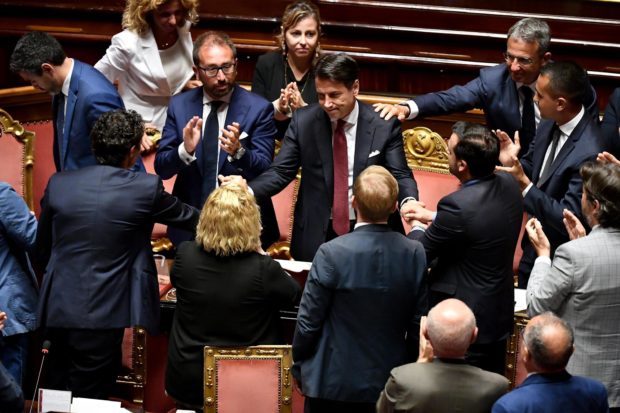Italian premier resigns, blames deputy for political crisis
ROME – Italian Premier Giuseppe Conte resigned Tuesday, blaming the collapse of his 14-month-old populist government on his rebellious, anti-migrant Interior Minister Matteo Salvini, who triggered a political crisis to try to force early elections.

Italian Premier Giuseppe Conte, center, is congratulated at the end of his address to the Senate, in Rome, Tuesday, Aug. 20, 2019. Italian Premier Giuseppe Conte has told senators he’s handing in his resignation because his right-wing coalition partner has yanked its support for the populist government. (Ettore Ferrari/ANSA via AP)
Addressing the Senate, Conte blasted Salvini for setting in motion a “dizzying spiral of political and financial instability” by essentially pulling the plug on the government. Salvini’s right-wing League party sought a no-confidence vote against Conte earlier this month, a stunningly bold move for the government’s junior coalition partner.
Conte, a lawyer with no political experience who was tapped to break a post-election stalemate last year, handed his resignation to President Sergio Mattarella at the presidential palace Tuesday night.
Mattarella, who is head of state, requested that Conte and the rest of the government stay on in a caretaker role, while he works in the coming days to determine whether to call new elections. Mattarella will first see if another viable coalition can be cobbled together.
Salvini, who sat next to Conte during his speech, smirking at times, declared, “I’d do it all again.” He repeatedly kissed a rosary he slipped out of his pocket right after Conte rebuked him for associating “political slogans with religious symbols.”
Pressing for elections as soon as possible, Salvini said: “I don’t fear Italians’ judgment.”
Article continues after this advertisementIn the European Parliament election three months ago in Italy, as well as in current opinion polls, Salvini’s League party has become the No. 1 political force among Italians. His crackdown on migrants, whom the party’s voter base largely blames for crime, appears to be a huge factor in Salvini’s climbing popularity.
Article continues after this advertisementEarly elections would pull the plug on Parliament 3½ years ahead of schedule, perhaps as soon as late October. That would mean political campaigning in the middle of delicate budget maneuvers that will be closely monitored by the European Union. The EU is concerned about Italy’s shaky finances and long stagnant economy, and it expects billions of euros in budget slashing that lawmakers running for office might be loath to make.
Should any early elections sweep Salvini into power, financial markets could be rattled by his Euro-skepticism.
Depicting himself in counterpoint to Salvini’s often derogatory depiction of European Union rules, Conte said: “I tried in these 14 months to guide Italy’s policy along the path of a critical pro-Europe line, but always oriented constructively.”
While oft-bickering, the government made up of the anti-establishment 5-Star Movement and the rival League party reflected the results of Italy’s 2018 election and aimed to “interpret the desires of citizens who in their vote expressed a desire for change,” Conte said.
Despite the acrimony, Conte defended the government’s support for Salvini’s migrant crackdown, including stiffening fines to as much as 1 million euros ($1.1 million) for captains of humanitarian rescue boats who dock without permission and allow migrants ashore, as well as the seizure of such boats. /gsg